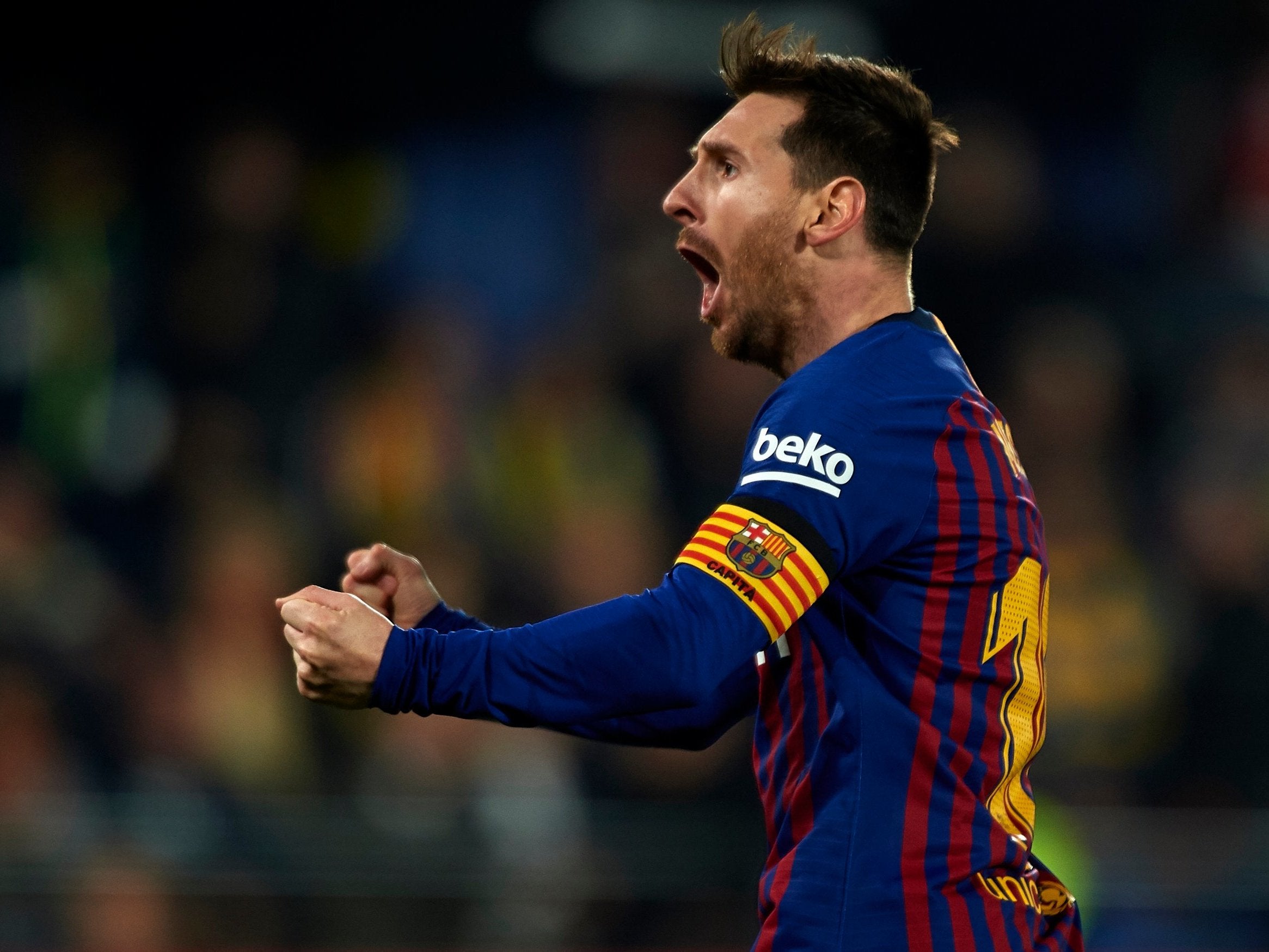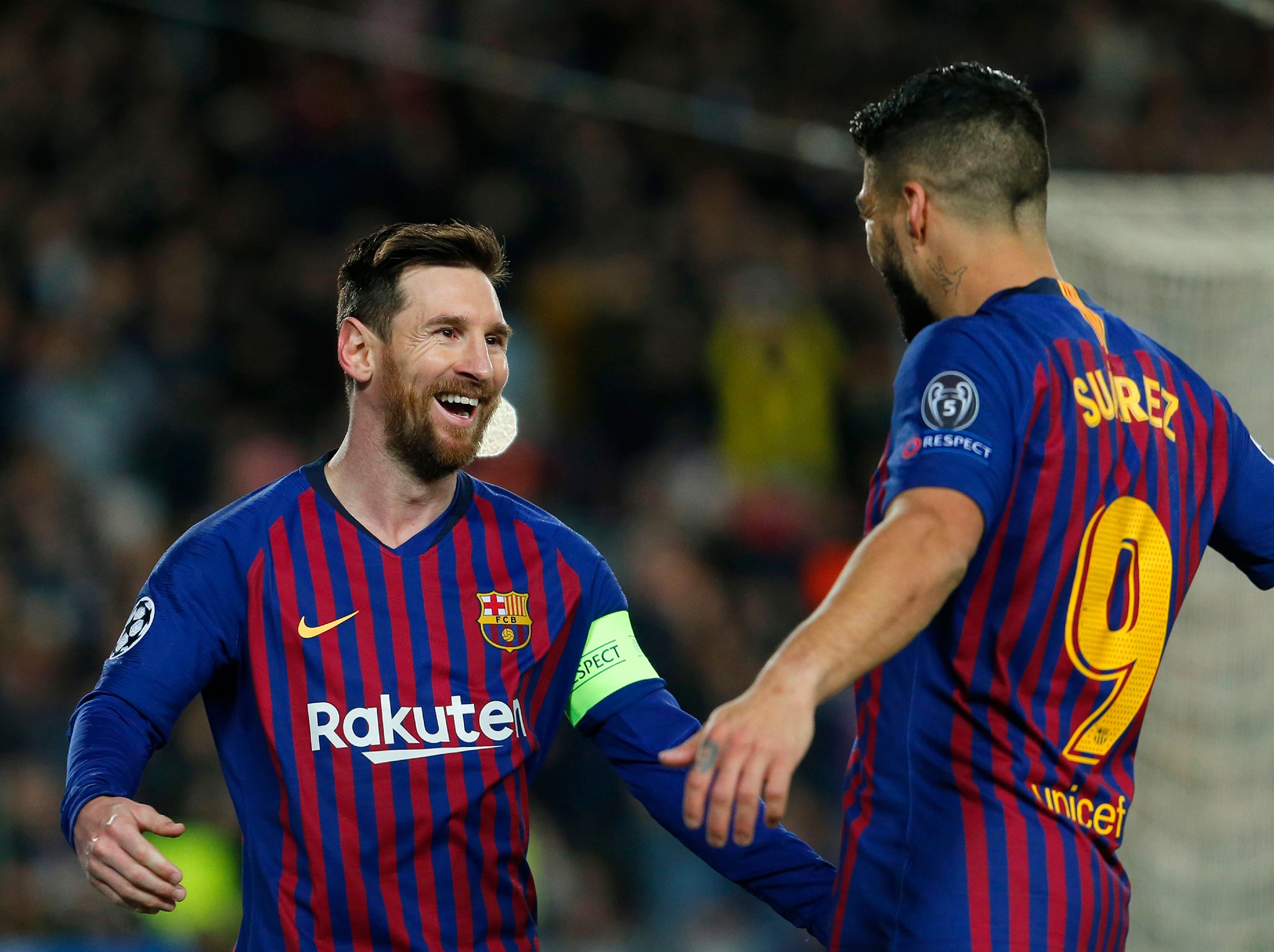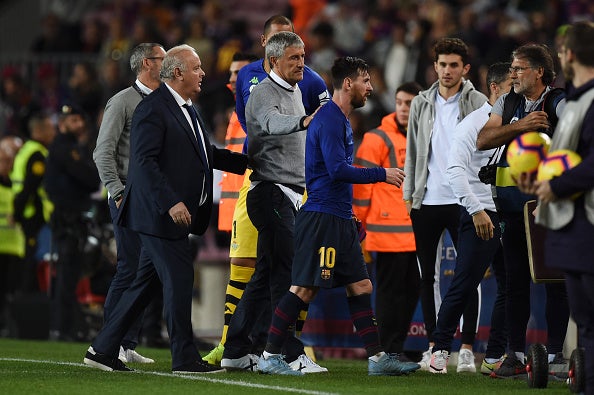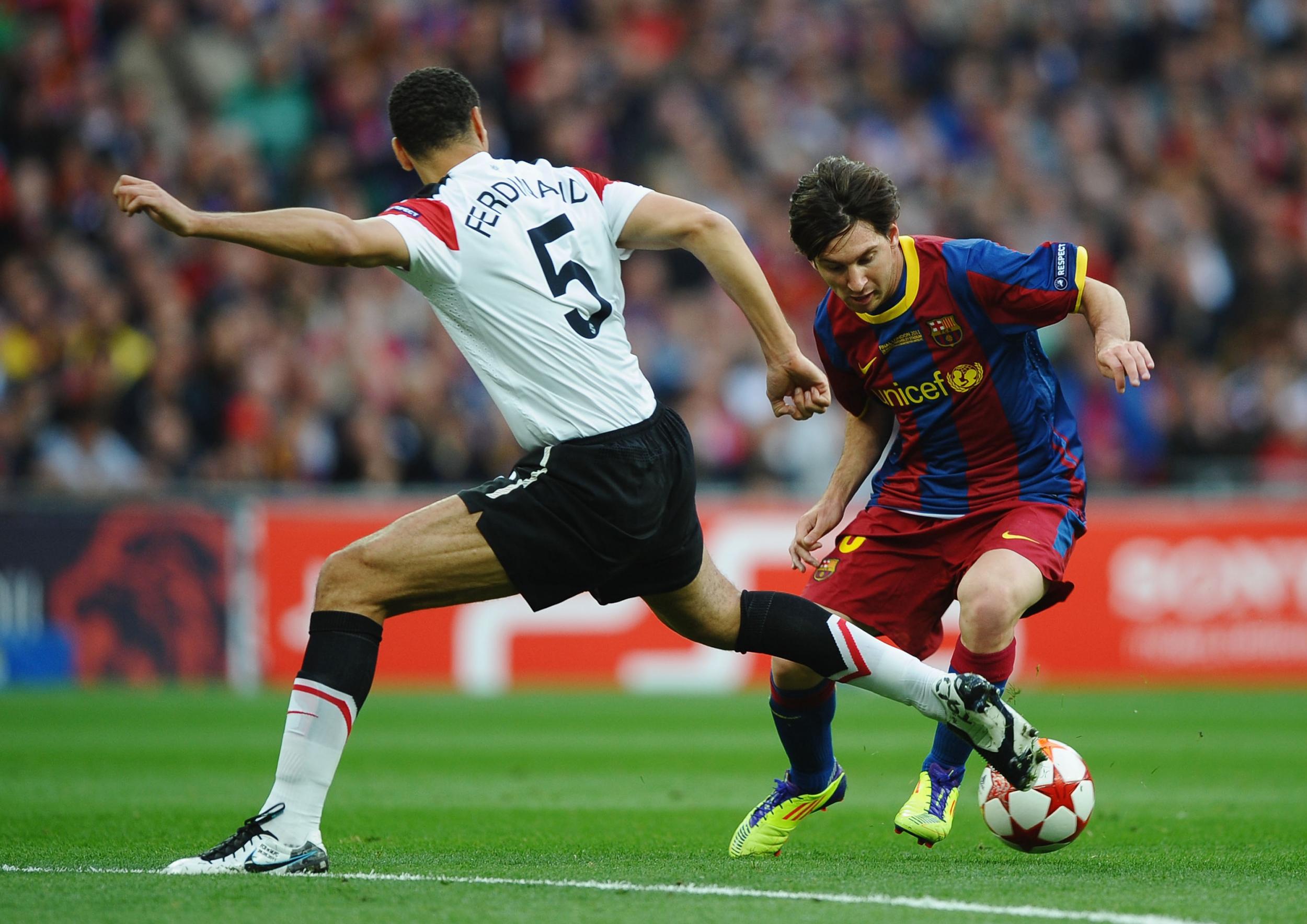Manchester United vs Barcelona: Time running out for Barca to make most of Lionel Messi’s everyday excellence
Barca have been blessed with one of history's greatest-ever players for so long that it is a mystery they've won so few Champions League trophies

When the Barcelona players got back into the dressing room after Saturday’s 2-0 win over Atletico Madrid that effectively secured the Spanish title, there weren’t exactly wild celebrations. There was a general sense of satisfaction, a few ‘well dones’, but mostly just a sense of business. Lionel Messi, who absolutely radiates this approach right now, wouldn’t have it any other way. He knows that the main work is still be done, starting at Manchester United on Wednesday. That’s because, over the last few weeks, some pointed comments made by his great friend Carles Puyol have been playing on his mind even more. They’ve been mentioned in that dressing room.
“I am convinced [Barca] have a better team than Madrid and yet they’ve won four Champions Leagues in five years,” Puyol said in May. “We are losing an opportunity and it angers me as a Barca fan.”
Accused of criticising manager Ernesto Valverde at the time, Puyol later clarified his comments, and specifically what that “opportunity” is.
“We have a great team and we have Leo… I have no doubt who the best footballer in the world is but you must take advantage of Leo’s talent in La Liga and in Europe.”
The latter reflects a lingering concern at Camp Nou about this era, especially for a club that for a long time had a huge neurosis about the European Cup. Barca were absent from the competition’s roll of honour for the first 37 years of its history, and still only on it once by the 50th anniversary in 2005. The worry now is that a mere four Champions Leagues – one of them won when Messi was 18 and enduring one of his frequent injuries at that age – just isn’t a sufficient return from the “advantage” of having maybe the best player in history for 14-plus years.
That an inferior Real Madrid have claimed as many in half a decade – to bring the competition’s second-greatest ever spell of success at a time when they have almost always been second to Barca in Spain – makes it all the more painful.
Messi himself is highly conscious of this. While he is obviously very far from a snarling ranter, everyone who knows him says he does have similar winning standards to famously demanding figures like Roy Keane, and can make sure they are adhered to – if in different ways. The 31-year-old can be cold, and capable of cutting comments to teammates, even if young players do say he is open to them and shows interest when they first get promoted to the first team.
And yet it is those very standards that have helped ensure Barca really have taken advantage of Messi’s talent in the league, as Puyol implored, but also that yet another element of the Argentine’s career has gone somewhat underappreciated.
That, after all, has been another part of his legacy. Messi’s displays of genuine genius have become so relentlessly regular that they feel routine, everyday, and don’t actually get the recognition they should. They’re just what he does.
Take your pick from the many elusively good elements of his game.

There is: the frequency with which he scores fantastically precise free-kicks; the perfection of seemingly impossible through balls few would see let alone then try; the ease with which he beats so many of the best defenders and – of course – the frequency with which he just scores.
But, now, there’s also the frequency with which he leads his team to league titles.
The win over Atletico will almost certainly bring Messi’s 10th, in the space of a mere 15 years. The last 11 years will have brought eight.
That’s a level of utter dominance little seen in the history of Spain, or pretty much anywhere else. It’s utterly unprecedented in Barcelona’s history.

It wasn’t just the European Cup they’ve notoriously had neuroses about, after all, but also the domestic league and their great rivals in Madrid who dominated it. Barca have gone on droughts of 14 years and 11 years, winning just two in the 30 seasons between 1959-60 and 1990-91, all while more and more titles amassed in the Bernabeu. Messi’s singular mindset and unique talent has just cut through all of this, lifting the transformations brought by Johan Cruyff and Pep Guardiola to greater levels. Managers and stars have come and gone in his time, but Messi has remained, and thereby so has Barca’s level with him. There’s no transition period when he is there.
Messi has instead transformed the club into the default Spanish title winners, a status that had previously always defined Madrid.
That shift really shouldn’t be underestimated, especially given the extreme turbulence of most of Barcelona’s history, but often feels like it is. They used to end every second season in “crisis”. They now end almost every season with the title. That is just another illustration of Messi’s everyday excellence – to go with all of those individual moments of divine inspiration.
Because, for all that the prestige of the Champions League rightfully elevates legacies, it is domestic league campaigns that really offer better reflections of better quality.

Many would reflexively argue about that, but it is really a case of the perfect purity of maths against the imperfection of perception and influence of glamour. The Champions League is undeniably the most prestigious knockout competition in club football, with all of that deepened by the gravitas of six decades of high-class history, but a knockout competition is still all it is.
It is still prone to the same nuances, or freaks of fortune, as any other much less prestigious cup. Lucky draws, nice bounces, bad decisions, bad days all have a highly disproportionate effect. That ensures the best team only sometimes wins it. It is, mathematically, much more of a lottery.
None of this is the case in a league. Single incidents like that just can’t have the same influence. The maths of it ensure that their effect is eroded, and it becomes about accumulation of events, as well as consistency. The best team thereby almost always wins.
And in Spain, the best player has almost always won. This is the essence of Messi’s everyday excellence. Real Betis manager Quique Setien has endured it as much as any one, but can also allow himself to enjoy it, as was the case with that sublime chip a few weeks ago.

“He’s pure,” Setien told The Independent last year. “He’s not only one thing. He’s everything.
“When you have a footballer like that, who can do it on his own, there’s nothing to say. The other 10 are going to say ‘let him do what he wants, he’s going to make us better, and we’ll win more matches.’”
This has precisely been the case, and produced so many titles. It is why that “everyday excellence” has naturally translated into the most triumphant spell of domestic success almost any European club has known, winning the title almost every season.
Hence the sense of business as usual after beating second-placed Atletico.
Hence the deep desire now for something greater.
Messi knows the Champions League is a lottery, and has even reassured teammates with that during some of Barca’s lower moments in the competition over the last few years. They haven’t got beyond the quarter-finals since their last victory, in 2015.
He also knows that his legacy will still be judged on it, especially against his own great rival in Turin.
There’s also the more basic desire to just win such a trophy. That’s who he is.
That’s what Old Trafford will see.
In that, this season is again seeing certain elements line up in that narratively appealing way that football has a habit of offering up.
Old Trafford and Anfield are the only English stadiums that Messi has played in but not scored in, and he may have the opportunity to do both, en route to a potential fifth personal Champions League. If Barca beat United, Liverpool may await in the semi-finals. Both will encounter a very different Messi to that of 2008, and 2007, respectively.
There’s also the fact that, while Old Trafford might not have seen the best of him, United certainly have. If much is made of how the club got to witness the rise of Cristiano Ronaldo, it also got to witness the rise of Messi, in a much more painful way. United were the side against which he enjoyed his finest, most defining Champions League moments. They were the side that suffered his only final goals.
Messi scored the clinching header in the 2-0 win in Rome 2009, and then the clutch pile-driver that finally and definitively put Barcelona ahead in the 3-1 win in Wembley 2011.
It was his performance in the latter match, when he really rose to a historic standard of performance, that left a lasting impression on the United players – and particularly the defenders marking him.
An awe for Messi runs right through Rio Ferdinand’s insightful autobiography. Reading it, you get the sense the former centre-half doesn’t want to offend his old teammate Ronaldo, but his words indicate he clearly thinks Messi is on another level to anyone.

“Should I stay or should I go?” Ferdinand wrote of the dilemma facing the Argentine. “I never knew. Gaps opened and Messi exploited the space between our lines… as defenders, we never got to grips with Messi at all. Most of the time, he played deep, well away from us. Then he’d suddenly ghost in the box and you couldn’t catch him. I thought: that is fucking special. That is different. You’re not going to see that ever again in your lifetime.”
And this was against some of the best defenders United will have in any lifetime, and at their peak. They now have the more limited Chris Smalling and Victor Lindelof, against a Messi who has arguably gone on to another level.
He is not the same force of cosmic energy he was in 2011, but he is more complete, with more components to his game. He’s much more a playmaker than he was then, but still such a scorer. He’s also as at ease and as composed as he was in 2011 and 2015, for Barca’s last two Champions Leagues. That is no coincidence.
It is because he’s content with the side. Messi can be very difficult when he’s not happy with the team or the manager, but he respects Valverde. He appreciates the way the Basque has control of the dressing room, and thereby doesn’t need to flex his own power. He’s also happy that Barca are signing players like Frenkie de Jong, and are interested in Antoine Griezmann, because he sees them as more top players to play with and positive steps towards competing for the biggest trophies.
That keeps him content. It keeps him in the right frame of mind, ready to fully focus.
And he’s highly focused on one thing now. In that dressing room, Messi told the players “it’s time to bring that beautiful trophy with the big ears” back to the Nou Camp. That’s now the standard he expects, and the standard he’s set out.
Join our commenting forum
Join thought-provoking conversations, follow other Independent readers and see their replies
Comments